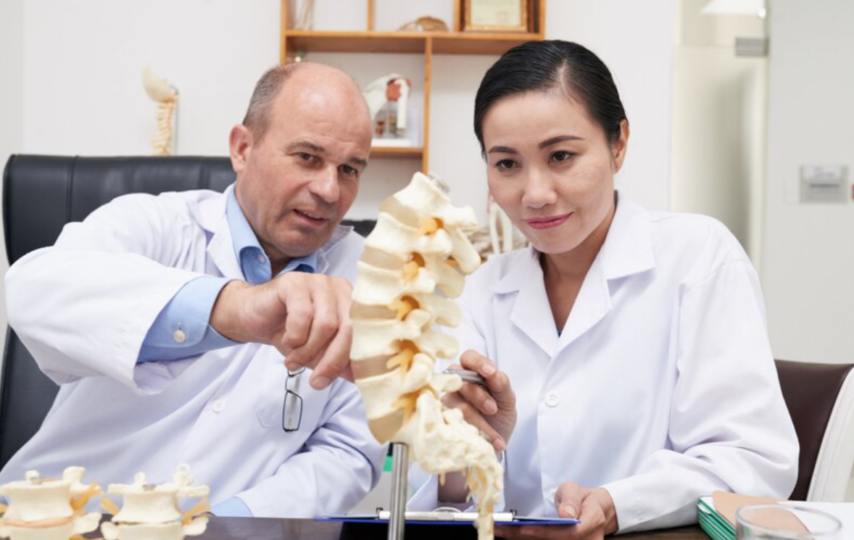Your bones are like the scaffolding that holds up a building, providing support and structure for your body. They’re essential for your health and well-being, helping you move, stand tall, and protect your organs. As we get older, our bones can weaken, leading to problems like osteoporosis. That’s why taking care of your bones and keeping them strong and healthy is essential. This article will explore simple tips to help you maintain strong and healthy bones for years.
Understanding Bone Health
Bones contain living cells that regenerate themselves through a process known as remodeling. Osteoclasts remove old bone, while osteoblasts build new bone. New bone formation outpaces bone removal during childhood and adolescence, increasing bone mass and density. This process continues until around 30 when peak bone mass is typically reached. Following that, bone remodeling occurs, but the balance shifts, with bone removal frequently outweighing bone production, resulting in a steady loss of bone density.
With the bone density solution, you can address this natural decline by implementing lifestyle changes and interventions designed to slow down the loss of bone density. This includes dietary adjustments, physical activity, and possibly medication or supplements under medical guidance, aiming to maintain or increase bone strength as you age.
Factors Affecting Bone Health
- Age is a crucial factor affecting bone health. As people age, their bones weaken and become more susceptible to fractures. Bones naturally lose density and strength over time, especially after age 30.
- Gender can also affect bone health. Women, particularly after menopause, are more likely to get osteoporosis, an illness that causes bones to grow weak and brittle. It is due to hormonal changes that affect bone density.
- Genetics plays a role in determining bone health. Some people might possess genetic mutations that increase their risk of having osteoporosis or other bone-related disorders. However, diet and exercise can also influence how these genes express themselves.
- Nutrition is essential for preserving solid bones. Calcium and vitamin D are vital minerals that aid in developing and maintaining bone density. A diet lacking in some crucial minerals can result in bone fragility and a higher chance of fractures.
Tips For Maintaining Healthy Bones
Eat a Balanced Diet
Calcium-rich foods include milk, leafy greens, and fortified foods. People can obtain Vitamin D via sunlight or by supplementation. Caffeine and alcohol can inhibit calcium absorption, so restrict your consumption.
Engage in Weight-Bearing Exercises
Activities where your body works against gravity, like walking, jogging, dancing, or lifting weights, help strengthen your bones. These exercises are like giving your bones a workout, which can help them stay healthy and strong. Strength training exercises, like lifting weights, are perfect for strengthening bones.
Quit Smoking and Limit Alcohol Intake
Smoking and drinking may make the bones more fragile and prone to shattering. Quitting smoking and reducing alcohol use can help you maintain strong and healthy bones. It’s like giving your bones a break from potentially harmful substances.
Maintain a Healthy Body Weight
Being too light or too heavy can be bad for your bones. Eating healthy foods and being physically active will help you maintain a healthy weight for your bones. It’s like ensuring your bones have the proper support to stay strong.
Ensure Proper Posture and Body Mechanics
Sitting and standing up straight can help keep your bones in good shape, especially your spine. When you lift heavy things or do the same movements repeatedly, it’s essential to do it in a way that doesn’t strain your bones and muscles. It’s like teaching your body to move in a way that keeps your bones safe.
Get Regular Bone Density Screenings
Getting tests to check how dense and strong your bones are can help catch problems like osteoporosis early. This way, you can get help to keep your bones healthy before they get too weak. Women who have gone through menopause and older adults should talk to their doctor about when to start getting these tests.
Consider Supplements if Necessary
If you need more calcium or vitamin D from your food, taking supplements can help. These supplements can help keep your bones strong, but it’s essential not to take too much. Taking too many supplements can be harmful, so it’s best to talk to your doctor first.
Signs Of Weak Bones You Shouldn’t Ignore
Fractures
Fractures, or broken bones, can occur from a minor fall or even a simple movement like bending over. When bones break easily, they are weak and more prone to breakage, which may be a sign of osteoporosis or other bone health issues.
Height Loss
Shrinking in height over time can be a sign of weak bones. It can happen when the bones in the spine start to collapse or compress due to conditions like osteoporosis, making a person appear shorter than before.
Back Pain
Weak bones could cause persistent back discomfort, especially in the lower back. This pain may be due to fractures or the collapse of spinal bones, which can occur when bones are not strong enough to support the body properly.
Bone Deformities
Unusual or visible changes in the shape of bones, such as a curved spine or stooped posture, can be signs of weak bones. Osteoporosis weakens the bones and affects their structure, leading to these changes.
Tooth Loss
Losing teeth without significant trauma or decay can be a sign of weak bones in the jaw. It could indicate that the bones in the body, including those in the jaw, are not as strong as they should be, possibly due to osteoporosis or other bone health issues.
Can genetics play a role in bone health?
Yes, genetics can play a role in bone health. Some aspects of bone health, such as bone density and strength, can be influenced by our genes. Genes can affect how our bodies build and maintain bone tissue, impacting our risk of developing conditions like osteoporosis. However, lifestyle factors like diet, exercise, and avoiding smoking also play essential roles in bone health.
Conclusion
Caring for your bones is critical to your overall health and quality of life. Following the advice in this article can help keep your bones strong and healthy. Remember to consume a well-balanced diet high in calcium and vitamin D, exercise regularly, and avoid smoking and excessive alcohol intake. It is possible to begin caring for your bones, so why not start now? Incorporate these tips into your everyday routine to improve your bone health.








